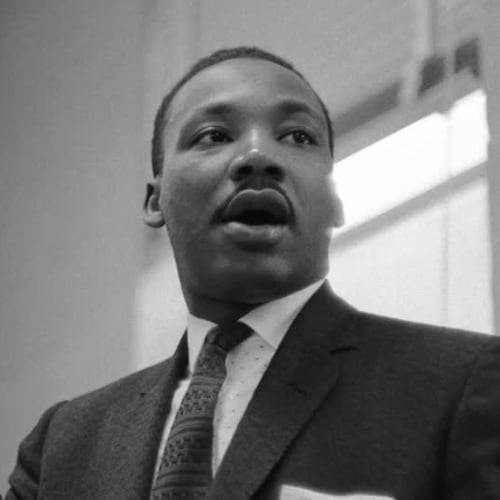Speaking recently by phone, retired Savannah chef Joe Randall remembered the dish prepared by his late friend Darryl Evans, his insightful comments and the occasion. It was 1994 at the Grand Hyatt Hotel in Washington, D.C., where he and Evans were participating in “A Taste of Heritage,” a dinner event prepared by and honoring the legacies of Black chefs.
Evans prepared an elaborate mushroom terrine made with sauteed morels and grilled shiitakes, themselves stuffed with pureed chicken breast mousse, served with corn and mushroom relish. It also featured a “smoked tomato essence,” according to the chef.
“It was a winner,” Randall says of the terrine. “They loved it. And you heard him talking about lighter food. That’s where his mind was — always thinking about the future.”
Evans, a native of Columbus, Georgia, was the first African American member of the U.S. Culinary Olympic Team, for whom he won four gold medals.
Credit: arvin.temkar@ajc.com
Credit: arvin.temkar@ajc.com
A nationally recognized chef, he trained under Tom Catherall, founder of Atlanta’s Here to Serve restaurant group. Evans also joined Catherall at culinary competitions around the U.S., often as the only Black chef in the room.
“He was a mirror image of me in regards to food,” Catherall told The AJC in 2014. “Whatever I made, he could make it exactly the same. I didn’t have to worry about the kitchen when Darryl was there.”
In the 1990s, Evans was executive chef for some of the Atlanta area’s best restaurants, including Cherokee Town and Country Club, City Club of Buckhead, the Four Seasons Hotel and Villa Christina.
Though he passed away a decade ago from lymphoma at 52, Evans’ legacy continues through the continued accomplishments of chefs he worked with, mentored and inspired. That list includes some of Atlanta’s most recognized Black chefs: Todd Richards of One Flew South, Duane Nutter of Southern National, and the first African American Certified Master Chef, Daryl Shular.
Credit: Chris Hunt
Credit: Chris Hunt
Evans spoke in June 1993 at Shular’s graduation from the Art Institute of Atlanta, after Evans had recently competed as part of the U.S. Culinary Olympic team. Shular remembers Evans standing at the podium, at just over 5 and a half feet tall, wearing a tall toque, the pleated white hat favored by European chefs.
Credit: NICK ARROYO
Credit: NICK ARROYO
“He got up there and told his story about his journey,” Shular remembers. “Sitting there and listening to Chef Evans, I was like, ‘That’s what I want to do.’ My world was changed at that moment.”
Shortly after graduation, Shular was hired by Evans at Anthony’s Fine Dining, a Buckhead restaurant where Evans was executive chef. Shular worked under Evans for a year, until Evans left Anthony’s to work at the Occidental Hotel, which soon became Atlanta’s Four Seasons Hotel. In 1995, Shular took a job at Villa Christina, and a year later Evans was hired to run the kitchen, which also included young chefs Nutter and Richards.
“It was at Villa Christina where the magic [was] really happening,” Shular remembers. “When you think about some of the top chefs in Atlanta right now, we all were in that kitchen working for Chef Evans. It set the stage for who we are today.”
Richards agrees. “He had a way of knowing how to get the best out of cooks in his kitchen. His determination to make us great was something I took hold to.”
During this year’s Valentine’s Day dinner service at Southern National, Nutter remembered helping Evans cater a large meal at New Birth Missionary Baptist Church in DeKalb County, where Evans and his wife Deborah were members. “It was a party for like 1,500 people; he made cornbread with no measuring cup in 25 minutes.”
Those chefs are not alone in keeping Evans’ legacy alive. Chef Charlie Hatney, who also worked with Evans, has hosted an annual dinner in Evans’ honor since 2017. There he gives the Chef Darryl Evans Milestone Award to a chef, recognizing their mentorship, professionalism and dedication to the culinary industry.
Credit: Mike Jordan
Credit: Mike Jordan
Nutter, who won the award in 2018, was deeply affected by Evans’ death.
“I almost stopped cooking. I didn’t know what else to do because he was my best friend, and my chef. When I first got here [from Louisiana], he used to take me to football games. I didn’t know anybody.”
Evans’ widow Deborah remembers him cooking jambalaya at home. She also traveled to other cities to help run food when Darryl’s job required.
“My Darryl was extremely talented,” Deborah says with an audible smile. As she talks about his awards, which she keeps in the Stone Mountain home they shared, she beams with remembrance. “All of these accolades remind me of the beautiful life he lived.”
Credit: arvin.temkar@ajc.com
Credit: arvin.temkar@ajc.com
ABOUT THIS SERIES
The AJC’s Black History Month series focuses on the role of African Americans and the Arts and the overwhelming influence it has had on American culture. These daily offerings appear throughout the paper. More subscriber exclusives on the African American people, places and organizations that have changed the world are available at ajc.com/news/atlanta-black-history.
About the Author
Keep Reading
The Latest
Featured





